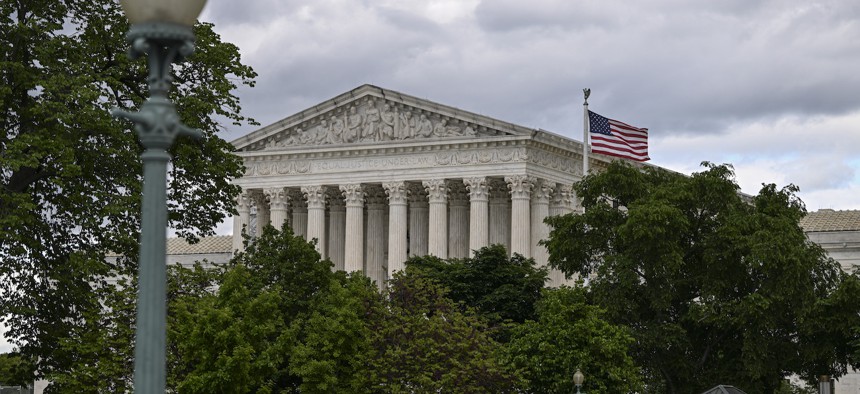
The Supreme Court issued a 7-2 decision Thursday upholding the FLRA’s ability to enforce the bargaining rights of dual status technicians. Celal Gunes/Anadolu Agency via Getty Images
Federal Labor Law Applies to Civilian Technicians in State National Guards, Supreme Court Affirms
The state of Ohio had argued it did not fall under the jurisdiction of the Federal Labor Relations Authority, despite the fact that “dual status technicians” are federal employees.
The Supreme Court on Thursday reaffirmed that state national guards operate under the jurisdiction of the Federal Labor Relations Authority when they supervise a cadre of hybrid federal-state employees.
In Ohio Adjutant General’s Department v. Federal Labor Relations Authority, the state of Ohio challenged the FLRA’s authority to regulate the labor practices of state militias under the 1978 Civil Service Reform Act.
At issue is the state national guards’ corps of technicians, who are civilian federal employees who work in a variety of clerical, administrative and technical roles to support National Guard operations. These employees, referred to as “dual status technicians,” are hired, fired and supervised by state national guards, but are federal workers paid by the Defense Department and afforded the same rights and protections most other federal employees receive, including those associated with collective bargaining.
In 2016, the Ohio National Guard repudiated an expired but still in-effect collective bargaining agreement with the union of technicians, arguing that the state is neither bound by the contract nor the Civil Service Reform Act. It then cancelled the union dues payroll deductions from most dues-paying members, prompting a series of unfair labor practice complaints that the FLRA upheld in 2020, triggering the court case.
Following a January hearing in which the justices appeared skeptical of Ohio’s arguments, the Supreme Court issued a 7-2 decision Thursday upholding the FLRA’s ability to enforce the bargaining rights of dual status technicians.
“Dual-status technicians are ultimately employees of the secretaries of the Army and the Air Force, and petitioners are the secretaries’ designees for purposes of dual-status technician employment,” wrote Justice Clarence Thomas for the court’s majority. “Should a state adjutant general wish to employ federal dual-status technicians, he must do so pursuant to delegated federal authority and subject to federal civil service requirements. Indeed, it would be passing strange if dual-status technicians, who qualify as employees under the statute, were supervised by an entity not required to safeguard the rights guaranteed employees under the statute.”
The court’s majority found that although the Ohio National Guard is not a federal agency, it must act as one when it supervises the federal workers that it employs, per the 1968 order by the Army secretary establishing dual status technicians, analogous to how components of federal agencies, such as the U.S. Forest Service within the Agriculture Department, are bound by the Civil Service Reform Act.
Thomas wrote that even the court system’s naming convention for the case belies the idea that the Ohio National Guard is merely a state militia, exempt from federal labor law.
“The case caption in this matter reflects the guard’s federal function with respect to hiring dual-status technicians; before the FLRA, the case proceeded against the ‘U.S. Department of Defense, Ohio National Guard,’ with the adjutant general and the adjutant general’s department joining the suit later as intervenors,” he wrote.
Justices Samuel Alito and Neil Gorsuch dissented from the ruling, arguing that the delegation of authority to state national guards does not constitute them becoming an agency within the context of federal labor law.
“The problem with this reasoning is that a ‘designation’ to exercise the authority of an ‘agency’ does not turn the designee into an agency,” Alito wrote. “Just because A is designated to exercise the authority of B, it does not follow that A is B . . . The same is true here. The designation of petitioners by the departments of the Army and Air Force to perform some of those departments’ duties and to exercise some of their authority does not turn petitioners into agencies or necessarily have any effect beyond assigning them those duties and responsibilities.”







